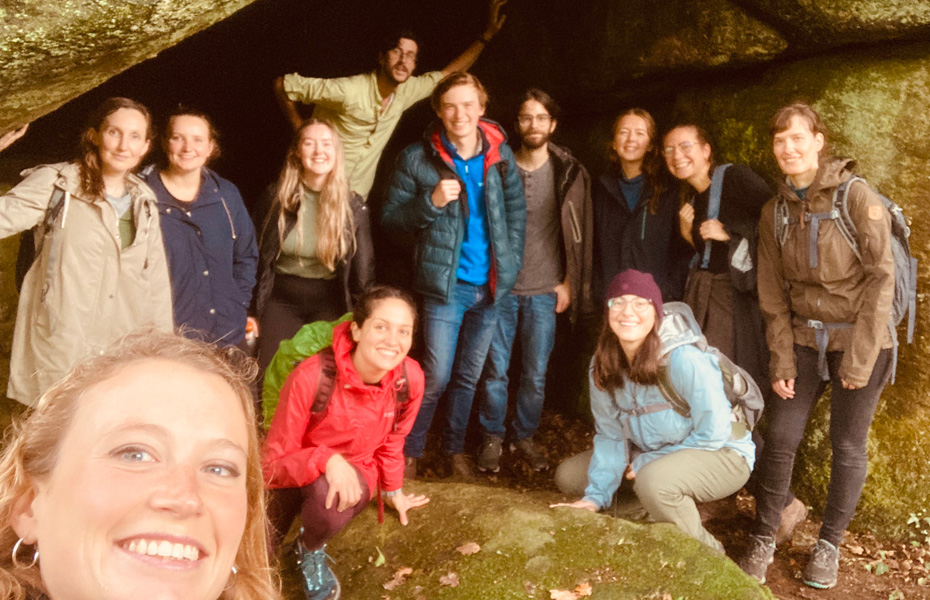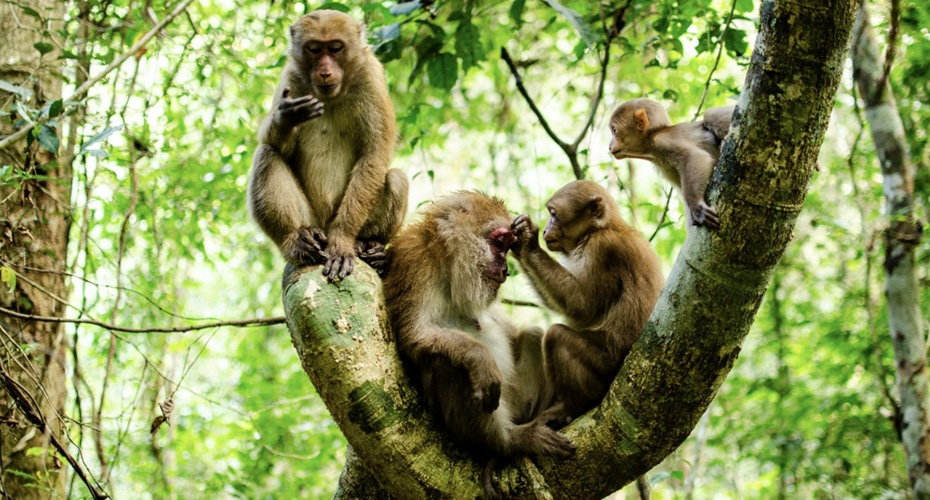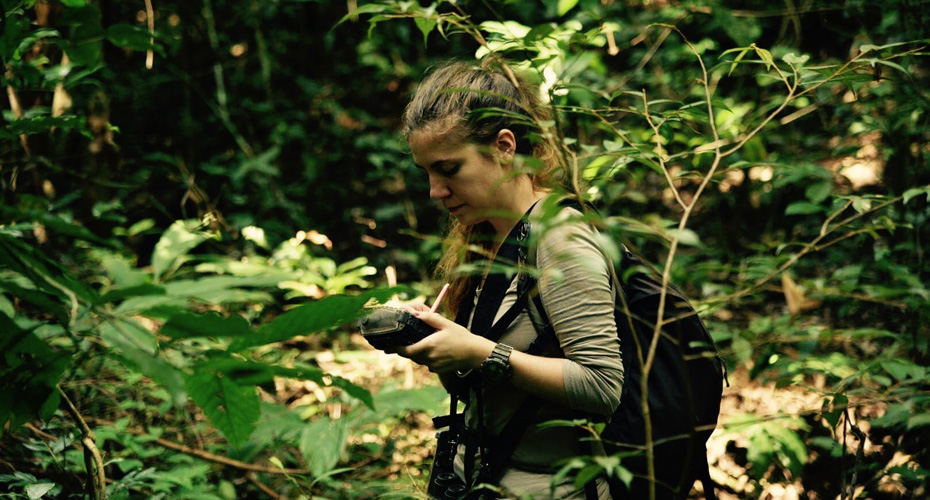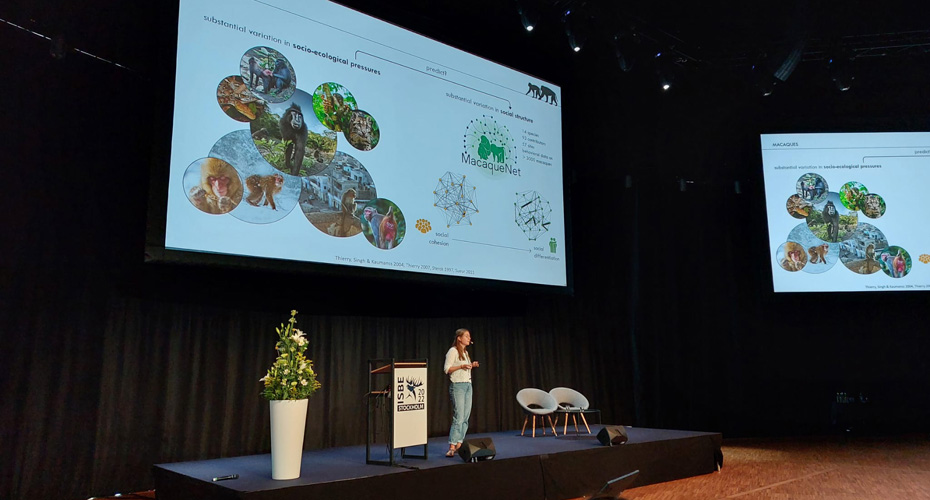
Delphine and some of her research team. Photo by Camille Testard.
Interview with a Soapbox Scientist: Dr Delphine De Moor
Imagine this: you are alone in a rainforest, following a troop of treetop-dwelling monkeys. The monkeys are used to your presence and completely ignore you, but you know them well. You have spent many months learning to recognise their faces: you now know each individual by sight, as well as which monkeys are close relatives, and which are close friends. You decide to take a ‘bathroom break’ from your monkey-watching. This involves sneaking away from the troop and finding a tree to duck behind.
As you walk behind your chosen tree, you come face-to-face with an Asian black bear. It looks at you. You look at it. There is a moment of indecision. Simultaneously, you back away from each other, as if in tacit agreement not to escalate this encounter any further. You return to the troop of monkeys, feeling both blessed and exhilarated. You sit down to recuperate, and in that moment one of your favourite monkeys descends from the canopy. She sits next to you. This has never happened before, and you’re not sure what to do. You simply sit still, stunned and happy, enjoying this rare and peaceful moment.
It may sound like something out of a storybook, but this was a day in the life of behavioural ecologist Dr Delphine De Moor. She was collecting data on Assamese macaques – a species of monkey that live in the Thai rainforest – for her PhD at the University of Göttingen. “That was my favourite day of research”, she tells me. “It was such a privilege to spend time with these animals in the wild.” Delphine quickly follows this dazzling image of fieldwork with a disclaimer, though. “Usually you’re up at 4am, walking two hours through the forest to find the monkeys, watching them for a whole day then going home and repeating for 365 days. It is hard work. But afterwards, you forget how hard it is and you just remember the special moments”.
Delphine’s primary research interest is understanding the evolution of friendship. During her PhD, she used behavioural data collected from Assamese macaques to ask whether monkeys have friendships with unrelated individuals in the same way humans do. “Humans have lots of important social relationships outside of our family members, but we don’t have a good idea of whether non-human animals do. That’s important for understanding the evolution of friendship. If family members help each other out, we can understand it very easily in terms of genetics. If you help a close relative, you help pass your DNA to the next generation. It’s not so easy to understand why non-relatives form friendships.”
Delphine found that male macaques sometimes form friendships with unrelated males, even when relatives are present. This suggests that Assamese macaques do make friends with non-relatives. “This finding forms a foundation for us to ask why this happens. What are individuals getting from these friendships? Answering this question could help us figure out why humans form these sorts of friendships too”.
"Usually you’re up at 4am, walking two hours through the forest to find the monkeys, watching them for a whole day then going home and repeating for 365 days. It is hard work. But afterwards, you forget how hard it is and you just remember the special moments."
After her PhD, Delphine moved on to her current position as a Postdoctoral Research Fellow in the Centre for Research in Animal Behaviour (CRAB), University of Exeter. Her research still follows the theme of understanding the evolution of friendship, but using a rather different approach. In her current project, Delphine is leading the construction of a database called ‘MacaqueNet’. MacaqueNet is a collection of macaque behavioural data from research sites across the globe, and involves the collaboration of many international research teams. “It’s big data and it’s big team science,” Delphine says. “And with it, we can do things that we could never do alone.”
MacaqueNet will help researchers answer all sorts of questions about the evolution of social relationships, but Delphine is looking at the complexity of social behaviour in particular. “There’s been an idea in macaque research that each species has a typical ‘social style’, but we’re finding that actually it is way more complicated than that. There’s as much difference in social behaviour within a species as between different species. This is really exciting from an evolutionary perspective, because we don’t know why it’s happening. It changes our understanding of macaque social life”.
I ask Delphine what inspired her to follow this career path, and she tells me that it all began with Jane Goodall. “I remember watching Jane Goodall on TV when I was a teenager and instantly knowing that I wanted to do what she did. I wanted to go and watch chimpanzees in the rainforest. And I did get to go and watch chimpanzees in the wild, just like Jane Goodall! But it turns out that I found it less interesting than I expected. The research was very focused on questions that didn’t excite me very much.”
This realisation led her to ask what it was she really wanted to work on, and the answer was understanding friendship. “I’m so interested in understanding why humans and animals do what we do in social situations. I always have been. I want to know why we make friends, and why we fall in love. I want to know why evolution has made us this way.” The macaques turned out to be the perfect species for Delphine to study because of their rich, complicated and dramatic social lives. “Honestly, watching the macaques is like watching a soap opera. Their social lives are fascinating, just like our own. Understanding why their social lives are the way they are gives us a window into understanding ourselves.”
Delphine’s self-declared obsession with social relationships has made for a fascinating career path. Her love for the topic is clear, but so is her enthusiasm and determination to try to make the scientific system a fairer, more cooperative space. “We can do more when we work together in teams. We can collect more data, ask bigger questions, and create a more inclusive, kinder place to be. We just need to cooperate more.”
As has been a theme throughout this interview, Delphine links her knowledge of evolutionary theory back to our everyday relationships. “We see, at an evolutionary timescale, that being cooperative wins over being selfish. People need each other. If we just accepted that and worked together a bit more, the world could be a better place.”
Interview by Beki Hooper.

About the Author
Beki Hooper is a freelance writer and researcher, with a PhD in animal cognition. Her science writing has appeared in numerous publications, including The Conversation, BOU Magazine and Psychology Today, where she writes a blog about the minds, relationships and behaviours of animals. She is also a Pushcart Prize nominated poet, with poems published and upcoming in multiple international literary magazines and anthologies. She lives in Devon, and when she isn't writing she is most often found wandering Dartmoor or swimming in the sea. You can follow her on Twitter @BekiHooper.



